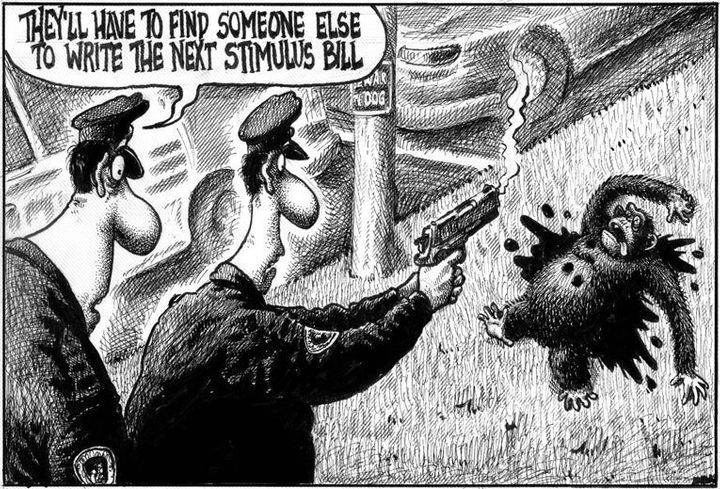
The Post's Post-Racial Politics
Originally published on Huffington Post.
Yesterday, as I prepared for the kick-off to the national discussion tour focused on the theme “Is America Really Post-Racial?” which will convene in ten US cities this spring, I received emails from around the country commenting on The New York Post cartoon that depicts a chimpanzee being shot by two white police officers. The cartoon prominently displays one of the officers saying, “They’ll have to find someone else to write the next stimulus bill.”
The commentary comes on the heels of the historic election of Barack Obama as the nation’s first Black president. During the campaign, Obama had been likened to the famed children’s book protagonist and monkey, “Curious George,” and numerous Americans openly expressing their discontent with the very idea of the US president for the first time not being a white male.
Likewise, the recurring backdrop to the historic campaign with an African American as frontrunner was the need for secret service protection for Obama due to the overwhelming number of death threats and the subsequent concern that some nut case might attempt to bring him harm — an idea reiterated by at least one attempted plan in Colorado to make good on the threats during the Democratic National Convention.
One of the routines that have long played out in American electoral politics when it comes to race is politics by suggestion and association. Willie Horton ads, Bill Clinton’s remark about Sister Souljah in 1992, the racially-charged commentary at McCain-Palin rallies during the primaries-all were designed with the intent that Americans would make an emotional connection to previously held ideas about race, racial cues if you will. This cartoon is no different.
Media and political elites intent on playing the game of American’s old racial politics have in the last several decades become quite adept at two primary tried and tested strategies: feigning innocent when they get called on their racist behavior; and when that doesn’t work, defending racist ploys by claiming those offended should get over their sensitivities and toughen their skin.
While it is true that a pet chimpanzee was shot days ago in Stamford, Connecticut that chimpanzee had absolutely nothing to do with the economic stimulus bill. President Barack Obama, by contrast, has been associated with the economic stimulus package from nearly day one of his administration.
So it is nearly impossible to not make some association between the Sean Delonas cartoon and recent current events. And it was painfully obvious to see those on the wrong side of the issue do this usual dance.
The good news is that those strategies have run their course. And like other divide and conquer approaches, such tactics, I believe, will continue fall flat in a post civil rights politics environment.
Make no mistake. The problem with the cartoon is that those not offended by it either don’t get it or don’t want to.
If Delonas didn’t realize how the cartoon would be perceived, certainly the editorial staff at the Post should have. It’s hard to fathom that given the history of derogatory references to people of African descent as “monkeys” that The Post‘s editorial team wouldn’t anticipate that African Americans would take offense.
Either both The New York Post and Delonas were asleep at the wheel and failed in their professional responsibility or there was intent on the part of one or both to fan the flames of America’s old racial politics. Either they lack cultural sophistication, desire a tantalizing media buzz, or they simply just don’t care. There really is no middle ground.
Almost a year ago on March 18th, during the 2008 presidential campaign, Barack Obama gave a speech entitled “a more perfect union” in which he challenged Americans to own up the to fact that race is an issue “this nation cannot afford to ignore . . ., a part of our union we have yet to perfect.”
This cartoon’s arrival on newsstands is way out of step with the times. Regardless of its intention, it reinforces the notion that national conversations on race are long over due.
